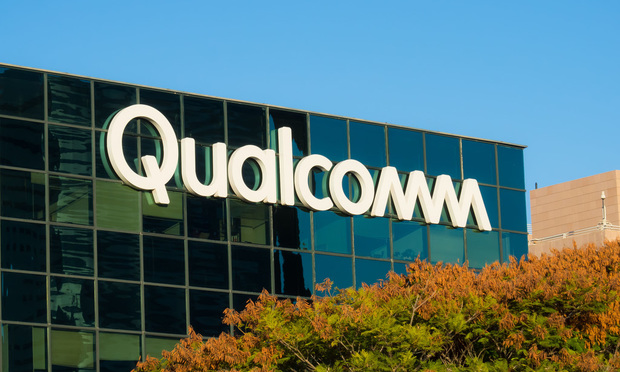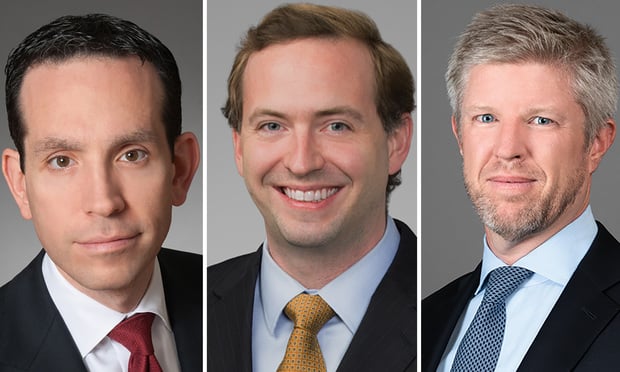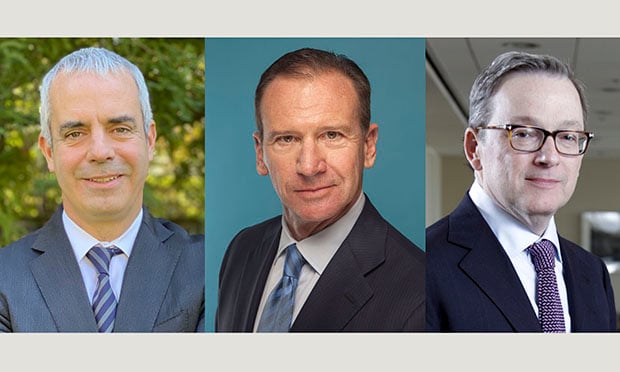Daily Dicta: Ouch. Judge Koh Names and Shames Qualcomm In-House Lawyers
The lawyers were criticized by name in a decision issued late Tuesday by U.S. District Judge Lucy Koh of the Northern District of California, who singled them out as the “architect, implementers, and enforcers of Qualcomm's licensing practices.”
May 23, 2019 at 11:22 AM
6 minute read
 What's the opposite of Litigator of the Week?
What's the opposite of Litigator of the Week?
Derek Aberle, Steve Altman, Eric Reifschneider, Fabian Gonell, and Lou Lupin.
The Qualcomm lawyers were criticized by name in a decision issued late Tuesday by U.S. District Judge Lucy Koh of the Northern District of California, who singled them out as the “architect, implementers, and enforcers of Qualcomm's licensing practices.”
Her bluntness is startling—rarely do you see a judge pointing the finger so directly at in-house counsel.
In a 233-page decision issued late Tuesday, Koh in siding with the Federal Trade Commission in a massive antitrust case found that the San Diego-based chipmaker “strangled competition.”
CNN called the ruling “disastrous” for Qualcomm. The New York Times said it strikes “at the heart of the company's business” and the Washington Post quoted an analyst who called it “a gut punch for Qualcomm.” The company's stock closed down almost 11 percent on Wednesday.
Koh in her opinion suggests company lawyers bear a large share of the blame for conduct she deemed anticompetitive—and that the lawyers were well aware they might be crossing the line.
 “Lawyers explicitly stated that Qualcomm's licensing practices raised concerns about antitrust liability, but chose to continue those practices anyway, with full knowledge that Qualcomm's unreasonably high royalty rates violate FRAND and that Qualcomm's licensing practices harm rivals,” Koh wrote. “That willful, conscious decision to continue Qualcomm's licensing practices is further evidence of intent to harm competition.'”
“Lawyers explicitly stated that Qualcomm's licensing practices raised concerns about antitrust liability, but chose to continue those practices anyway, with full knowledge that Qualcomm's unreasonably high royalty rates violate FRAND and that Qualcomm's licensing practices harm rivals,” Koh wrote. “That willful, conscious decision to continue Qualcomm's licensing practices is further evidence of intent to harm competition.'”
Ouch.
So who are these guys anyway?
Derek Aberle was president of Qualcomm until he left the company at the end of 2017, working his way up after he first joined Qualcomm as legal counsel in 2000. He earned his law degree from the University San Diego School of Law and was admitted to the bar in late 1996. He's now the president, co-founder and COO of Xcom.
He did not respond to a request for comment.
Per the FTC, “Aberle played a key role in Qualcomm's intellectual property licensing business for nearly 20 years, negotiated many of the license agreements central to the FTC's claims, and has received tens of millions of dollars in exchange for his contributions to Qualcomm's licensing strategies.”
He also apparently really didn't want to testify at trial. The FTC in December filed a motion asking for leave to serve him via certified mail. The agency explained that Aberle had dodged repeated attempts at service, to the point where a boy, presumed to be his son, duct-taped the gate to their house shut.
Aberle did wind up taking the stand—and Koh was not favorably impressed. “It is odd that Aberle had better recall during the January 2019 trial than nearly a year earlier at his March 2018 deposition. The court does not find Aberle's prepared for trial testimony credible,” the judge wrote.
Then there's Steve Altman—a fellow University of San Diego School of Law alum whom the FTC said also tried to avoid being served. Qualcomm described Altman as the “chief architect of the company's licensing business model.”
According to the FTC, Altman spent decades at Qualcomm, serving as general counsel until 2000, president from approximately 2004 to 2011, and vice chairman until he retired in January 2014
He could not be reached for comment.
Koh was not pleased with Altman's trial testimony either, ruling that a contemporaneous document he prepared 11 years earlier “is more persuasive than Altman's trial testimony given to avoid antitrust liability.”
Eric Reifschneider joined Qualcomm in 2012 from Dewey & LeBoeuf, where he was managing partner of the firm's Northern California offices and the chairman of its global technology and intellectual property group.
Petra Pasternak writing in 2012 for Lit Daily affiliate The Recorder covered his move to Qualcomm, reporting that he first worked alongside Aberle in patent litigation against Nokia and then became (in Aberle's words) “our go-to guy.” Previously, he was a partner at Cooley.
Reifschneider is now senior VP of strategic planning at the Marconi Group. He did not respond to a request for comment.
Fabian Gonell, who also did not respond to a request for comment, is senior vice president of licensing strategy and legal counsel for Qualcomm. He earned his law degree from Fordham and was previously a litigator at Cravath, Swaine & Moore.
Koh was particularly harsh in her assessment of his testimony, labeling it “not credible.” She added, “[T]he court rejects Qualcomm's self-serving justifications as pretextual.”
“First, Gonell pretended not to recall Qualcomm's 2012 IRS meeting until the FTC played a recording from the meeting with which Gonell disagreed,” Koh wrote. “Second, Gonell's own recorded statements to the IRS, a U.S. government agency, contradict Gonell's prepared for trial testimony. … Gonell's demeanor in court when feigning ignorance was also not credible.”
As for Louis Lupin, he was Qualcomm's general counsel from 2000 to 2007 and is barely mentioned in Koh's decision other than on the list of shame. He's now retired and could not be reached for comment.
So is there a larger lesson here? Or perhaps it's more of a warning—lawyers are supposed to know better. Whether you're in-house counsel or an executive with a J.D., Judge Koh for one will name names if she believes you tried to skirt the bounds of the law.
This content has been archived. It is available through our partners, LexisNexis® and Bloomberg Law.
To view this content, please continue to their sites.
Not a Lexis Subscriber?
Subscribe Now
Not a Bloomberg Law Subscriber?
Subscribe Now
NOT FOR REPRINT
© 2025 ALM Global, LLC, All Rights Reserved. Request academic re-use from www.copyright.com. All other uses, submit a request to [email protected]. For more information visit Asset & Logo Licensing.
You Might Like
View All
Litigators of the Week: Kirkland Trio Send a $765M Message in Tech Theft Case

Litigators of the Week: How Quinn Emanuel Team Kept It Simple—And Won $1.1B Verdict for Caltech

Daily Dicta: Why the Feds Deserved to Fail in Fitbit Trade Secrets Case

Qualcomm Asks 9th Circuit to Stay Antitrust Injunction in FTC Case
Trending Stories
- 1SDNY US Attorney Damian Williams Lands at Paul Weiss
- 2Litigators of the Week: A Knockout Blow to Latest FCC Net Neutrality Rules After ‘Loper Bright’
- 3Litigator of the Week Runners-Up and Shout-Outs
- 4Norton Rose Sues South Africa Government Over Ethnicity Score System
- 5KMPG Wants to Provide Legal Services in the US. Now All Eyes Are on Their Big Four Peers
Who Got The Work
Michael G. Bongiorno, Andrew Scott Dulberg and Elizabeth E. Driscoll from Wilmer Cutler Pickering Hale and Dorr have stepped in to represent Symbotic Inc., an A.I.-enabled technology platform that focuses on increasing supply chain efficiency, and other defendants in a pending shareholder derivative lawsuit. The case, filed Oct. 2 in Massachusetts District Court by the Brown Law Firm on behalf of Stephen Austen, accuses certain officers and directors of misleading investors in regard to Symbotic's potential for margin growth by failing to disclose that the company was not equipped to timely deploy its systems or manage expenses through project delays. The case, assigned to U.S. District Judge Nathaniel M. Gorton, is 1:24-cv-12522, Austen v. Cohen et al.
Who Got The Work
Edmund Polubinski and Marie Killmond of Davis Polk & Wardwell have entered appearances for data platform software development company MongoDB and other defendants in a pending shareholder derivative lawsuit. The action, filed Oct. 7 in New York Southern District Court by the Brown Law Firm, accuses the company's directors and/or officers of falsely expressing confidence in the company’s restructuring of its sales incentive plan and downplaying the severity of decreases in its upfront commitments. The case is 1:24-cv-07594, Roy v. Ittycheria et al.
Who Got The Work
Amy O. Bruchs and Kurt F. Ellison of Michael Best & Friedrich have entered appearances for Epic Systems Corp. in a pending employment discrimination lawsuit. The suit was filed Sept. 7 in Wisconsin Western District Court by Levine Eisberner LLC and Siri & Glimstad on behalf of a project manager who claims that he was wrongfully terminated after applying for a religious exemption to the defendant's COVID-19 vaccine mandate. The case, assigned to U.S. Magistrate Judge Anita Marie Boor, is 3:24-cv-00630, Secker, Nathan v. Epic Systems Corporation.
Who Got The Work
David X. Sullivan, Thomas J. Finn and Gregory A. Hall from McCarter & English have entered appearances for Sunrun Installation Services in a pending civil rights lawsuit. The complaint was filed Sept. 4 in Connecticut District Court by attorney Robert M. Berke on behalf of former employee George Edward Steins, who was arrested and charged with employing an unregistered home improvement salesperson. The complaint alleges that had Sunrun informed the Connecticut Department of Consumer Protection that the plaintiff's employment had ended in 2017 and that he no longer held Sunrun's home improvement contractor license, he would not have been hit with charges, which were dismissed in May 2024. The case, assigned to U.S. District Judge Jeffrey A. Meyer, is 3:24-cv-01423, Steins v. Sunrun, Inc. et al.
Who Got The Work
Greenberg Traurig shareholder Joshua L. Raskin has entered an appearance for boohoo.com UK Ltd. in a pending patent infringement lawsuit. The suit, filed Sept. 3 in Texas Eastern District Court by Rozier Hardt McDonough on behalf of Alto Dynamics, asserts five patents related to an online shopping platform. The case, assigned to U.S. District Judge Rodney Gilstrap, is 2:24-cv-00719, Alto Dynamics, LLC v. boohoo.com UK Limited.
Featured Firms
Law Offices of Gary Martin Hays & Associates, P.C.
(470) 294-1674
Law Offices of Mark E. Salomone
(857) 444-6468
Smith & Hassler
(713) 739-1250






